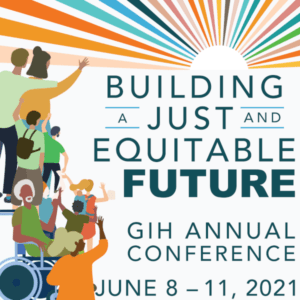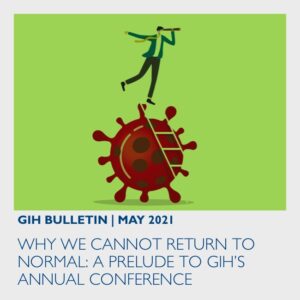Cara V. James, PhD, President and CEO, Grantmakers In Health
More than 157 million people in the United States—including 60 percent of all adults—have received at least one dose of a COVID-19 vaccine, with more than 123 million people fully vaccinated. Recently, the Centers for Disease Control and Prevention announced that fully vaccinated individuals do not need to wear a mask outdoors or indoors, and cities and states have removed many restrictions on gatherings, signaling a return to pre-pandemic life.
For those adapting to life without a loved one, living with the long-term effects of the virus, struggling after their business closed, or adjusting to the reality of the inequities inherent in our society, life will not return to normal. And I would argue that if we are truly committed to a better world, life should not return to normal for any of us.
Normal was when we did not appreciate just how many people and families are just one or two paychecks away from being food or housing insecure. Normal was a time when we were less aware of the detrimental effect that social isolation can have on a person’s health. Normal was when public health was underappreciated and underfunded. Prior to the COVID-19, we were collectively less informed of health disparities and of the social factors that drive them, and diversity, equity, and inclusion were often buzz words without much substance behind them. Before mass uprisings against racial injustice, we perhaps believed that our systems treated everyone equally and that victims of police violence were somehow responsible for their own victimization.
 It is against this backdrop that we will come together for GIH’s Annual Conference on Health Philanthropy from June 8-11. This year’s conference will not be a return to normal. Like many others, we are adapting, adjusting, and evolving to meet the moment. For the first time, the GIH annual conference will be held virtually. While this will make it more difficult to have impromptu chats that are the hallmark of in-person gatherings, we are excited that more people will be able to participate because they can log on from just about anywhere. And in recognition of the important role that partnership and collaboration play in achieving better health, we are also opening the conference to those outside of the grantmaking sector, so that our discussions can benefit from others who are working on projects related to philanthropy and health, and conducting work that is aligned with GIH’s mission, vision, and values.
It is against this backdrop that we will come together for GIH’s Annual Conference on Health Philanthropy from June 8-11. This year’s conference will not be a return to normal. Like many others, we are adapting, adjusting, and evolving to meet the moment. For the first time, the GIH annual conference will be held virtually. While this will make it more difficult to have impromptu chats that are the hallmark of in-person gatherings, we are excited that more people will be able to participate because they can log on from just about anywhere. And in recognition of the important role that partnership and collaboration play in achieving better health, we are also opening the conference to those outside of the grantmaking sector, so that our discussions can benefit from others who are working on projects related to philanthropy and health, and conducting work that is aligned with GIH’s mission, vision, and values.
In this year of change, attendees can expect the same rich conference content and variety of topics covered on our agenda. We will kick off the conference with a wide-ranging discussion about health philanthropy’s evolution pre- and post-pandemic and its role in building a future that we can be proud of. Another session will examine the Biden Administration’s priorities and how health funders can engage in reanimated public- private partnerships. There will be sessions on indigenous leadership during the pandemic, climate change and equity, behavioral health, rural health, maternal health, public health, community engagement, and more. In the week prior, we will offer a number of workshops, as well as a virtual site visit highlighting efforts to build a more local and resilient food system in Florida, where our conference would have been held had we been able to meet in person. You can see the complete agenda and register for the conference here.
The theme of this year’s conference is Building a Just and Equitable Future. As a prelude to the conversations we’ll have in June, we invited five thought leaders in health philanthropy to offer their reflections on our sector’s role in this moment. I’m thrilled that Stephanie Kripa Cooper-Lewter, TC Duong, Carl Lavender, Chiara Smith, and Edgar Villanueva agreed to share their personal journeys and struggles, achievements over the past year, and thoughts about what it will take for us to live up to our nation’s potential. I hope you will read and share their thought-provoking essays, and that you will join us in a few weeks for this year’s annual conference.

